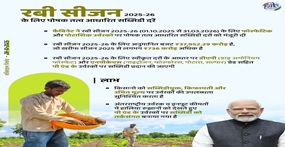13 October, 2025
Cabinet Approval for Nutrient Based Subsidy (NBS) Rates on P&K Fertilizers for Rabi Season 2025-26
Thu 30 Oct, 2025
Key Points:
- Implementation Period: 1 October 2025 to 31 March 2026
- Total Budgetary Requirement: Approximately ₹37,952.29 crore
- Comparison with Previous Kharif Season (2025): About ₹736 crore higher than the budgeted requirement for Kharif 2025.
- Comparison with Previous Rabi Season (2024-25): Around ₹14,000 crore higher than the previous Rabi season subsidy (₹24,000 crore), marking a significant increase in allocation.
- Total Fertilizer Subsidy (FY 2025-26): With this rise, the total fertilizer subsidy (including Urea and NBS) may exceed ₹1.95 lakh crore.
- Coverage: Includes all 28 grades of fertilizers such as DAP, MOP, SSP (Single Super Phosphate), and NPK complexes.
- Objective: To ensure the availability of fertilizers to farmers at affordable prices.
Approved Nutrient-Based Subsidy Rates:
| Nutrient | Kharif 2025 Rate (₹/kg) | Rabi 2025-26 Rate (₹/kg) | Change |
| Phosphorus (P) | 43.60 | 47.96 | +4.36 (10% increase) |
| Sulphur (S) | 1.77 | 2.87 | +1.10 (62% increase) |
| Nitrogen (N) | 43.02 | 43.02 | No change |
| Potash (K) | 2.38 | 2.38 | No change |
Nutrient Based Subsidy (NBS) Scheme
- The NBS Scheme was launched in 2010 by the Department of Fertilizers, Ministry of Chemicals and Fertilizers, Government of India.
Objective:
- Promote Balanced Fertilization: Encourage farmers to use fertilizers containing multiple nutrients like Phosphorus (P), Potassium (K), and Sulphur (S), instead of relying solely on nitrogen-based Urea.
- Enhance Fertilizer Efficiency: Ensure timely availability of fertilizers while reducing the overall subsidy burden on the government.
Key Features:
- Subsidy Based on Nutrients: Instead of controlling the final retail price, the government provides a fixed subsidy per kg of nutrients (N, P, K, S) contained in the fertilizers.
- Beneficiaries: The subsidy is provided directly to fertilizer companies, enabling them to sell fertilizers to farmers at reduced prices.
- Applicable Fertilizers: Covers Phosphatic and Potassic (P&K) fertilizers, mainly DAP (Di-Ammonium Phosphate), MOP (Muriate of Potash), and NPK Complex fertilizers.
- Exclusion of Urea: Urea, the main nitrogen fertilizer, is not covered under the NBS scheme. It remains under price control (MRP) and receives a traditional subsidy, which leads to its higher usage in India.
- Benefits: The scheme encourages farmers to choose fertilizers based on soil fertility and crop requirements, improving agricultural productivity and soil health.
Subsidy Calculation:
- The government announces the subsidy rates annually (or semi-annually) based on the per kilogram content of each nutrient (N, P, K, S) in the fertilizer.


















